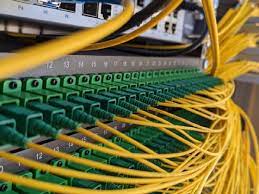In today’s world, where most business operations depend heavily on the Internet and technology, a robust and efficient network infrastructure is crucial. And at the heart of any network infrastructure lies the patch panel. In this article, we will dive deep into the world of patch panels, their importance, and the top patch panel manufacturers in the market.
What is a Patch Panel?
A patch panel is a networking hardware device that facilitates the connection of multiple devices to a network. Its primary function is to provide a centralized point for managing the cabling that connects different devices to a network. The panel allows for easy and quick changes, repairs, and upgrades without having to rewire the entire system.
Types of Patch Panels
There are several types of patch panels, including the Cat5e, Cat6, Cat6A, and fibre optic patch panels. Each type is designed to meet specific networking requirements, such as the cables’ bandwidth, speed, and distance limitations.
Top Patch Panel Manufacturers
Regarding Patch Panel Manufacturers, there are several options to choose from. Some of the top manufacturers include:
Panduit
Panduit offers a wide range of patch panels, including fibre optic, copper, and shielded copper patch panels. Their panels are designed for high-density applications and provide excellent performance and reliability.
Leviton
Leviton’s patch panels are known for their versatility and compatibility with various networking standards. They offer copper and fibre optic patch panels, making them an ideal choice for businesses with diverse networking needs.
Tripp Lite
Tripp Lite’s patch panels are designed to provide reliable and efficient network connectivity. They offer many patch panels, including unshielded and shielded copper, fibre optic, and PoE patch panels.
Benefits of Using a Patch Panel
Using a patch panel offers several benefits to businesses, including:
Simplified cable management
Patch panels allow easy cable management by providing a centralized connection point.
Improved flexibility
Changes, repairs, and upgrades can be made quickly and easily without disrupting the entire network.
Reduced downtime
With a patch panel, it’s easier to identify and fix connection issues, reducing the chances of network downtime.
How to Choose the Right Patch Panel:
Choosing the right patch panel can be challenging, especially for businesses with unique networking requirements.
Here are some factors to consider when choosing a patch panel:
Compatibility
Ensure that the patch panel is compatible with your networking standards and devices.
Port density
Consider the number of ports you need and choose a panel to accommodate them.
Cable type
Choose a patch panel that supports the type of cables you use in your network.
Installing a Patch Panel
Installing a patch panel requires some technical expertise and knowledge of networking standards. Here are the general steps involved in installing a patch panel:
Plan the installation
Decide on the location of the patch panel and the cable routing plan.
Mount the patch panel
Use screws or other hardware to mount the panel onto a sturdy surface.
Terminate the cables
Strip the cables and terminate them onto the patch panel according to the networking standards.
Test the connections
Use a cable tester to ensure that all connections are working correctly.
Conclusion
In conclusion, a patch panel is a critical network infrastructure component. It simplifies network cabling management and makes it easy to add, remove, or replace devices without having to rewire the entire system. When choosing a patch panel, it’s essential to consider your networking requirements and choose a reputable manufacturer such as Panduit, Leviton, or Tripp Lite. With the right patch panel, you can ensure efficient and reliable network connectivity for your business.

